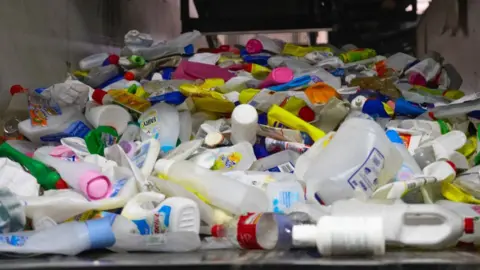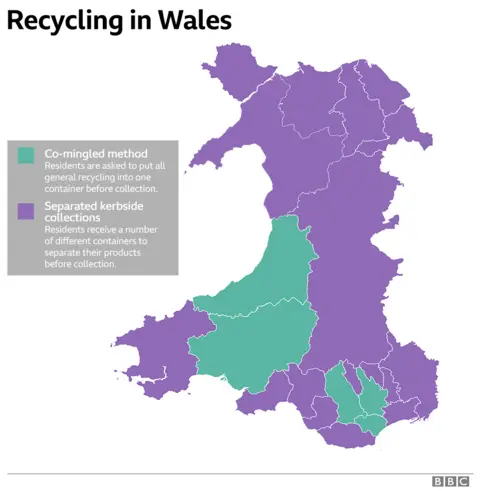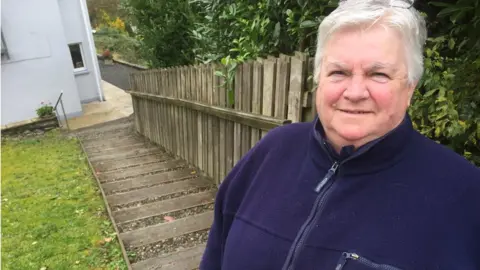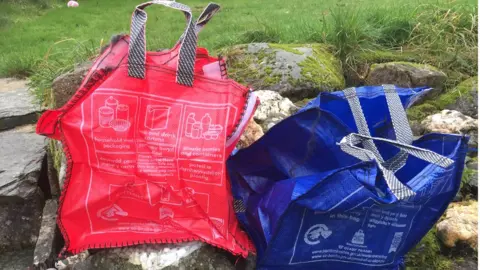Recycling: Why do collections vary around Wales?
 Getty Images
Getty ImagesRecycling is becoming second nature to many people, with Wales having the highest rate in the UK.
But is recycling as easy as it could be?
One council in Wales has just introduced a recycling system described as "too complicated" by some residents, who are being asked to separate their recycling into six separate containers.
Why are we being asking to recycle our waste?
The Welsh Government has brought in guidelines and targets in the last few years on how to cut down household waste.
Councils in Wales are expected to reach a 70% recycling target by 2024 or face fines of £200 per tonne.
The aim is for Wales not to produce any waste by 2050.
Wales had the highest UK recycling rate in 2017 at 57.6%.
It is the only UK country to exceed the EU's target to recycle at least half of all waste from households by 2020.
England and Scotland followed with 45.2% and 43.5% respectively.
How do Wales' 22 councils ask people to recycle?
The recycling system varies depending where you live.
Five out of the 22 councils operate a "co-mingled method".
This means residents are asked to put all general recycling into one container before collection. This is used by councils including Cardiff and Carmarthenshire.

The remaining 17 have separated kerb-side collections, in which residents receive a number of different containers to separate their products before collection.
Bridgend changed their system in June 2017 to include:
- a blue reusable sack for plastic bottles, pots, tubs and trays, and tins and cans
- an orange reusable sack that takes cardboard,
- a white reusable sack for paper
- a black recycling box for glass bottles and jars
In Blaenau Gwent, recycling is divided into mixed paper, plastic packaging, metal packaging, mixed glass, cardboard, textiles and small electrical items.
All councils also provide separate food waste disposal, garden waste collection and some will pick up nappies.
This means some households potentially have up to ten bins.
Why is the picture different across Wales?
The Welsh Local Government Association says local requirements mean it is not always appropriate to have the same system for all councils.
They highlight that rural areas have different needs to high concentrations of flats and house-shares which usually have communal waste facilities.
Cardiff has a sophisticated recycling facility but others rely on people sorting through their own recycling before collection.
Cardiff council says that by using the co-mingled method, the council is making it as easy as possible for residents to recycle their waste.
They said: "Kerb-side sort is often problematic in smaller properties, where residents do not have space to store multiple containers for different types of recycling at their property.
"This method also involves a significant investment in a new fleet of vehicles, as different waste types have to be stored in different cages as they are collected."
However in Powys, the biggest county in Wales, residents must spend more time organising their waste.
The council said it did not have the facilities to sort different recycled materials like they do in places like Cardiff.
"We ask our residents to put different material in different containers to make it a more efficient service with less contamination," a spokesperson added.
Cardiff council said research showed participation in recycling was often higher when using the co-mingling method, but the quality of the recycling collected could be lower.
Would standardising the process make it easier?
The Welsh Local Government Association said current variations could be due to different contract renewal dates across Wales for containers and vehicles.
"It would be difficult to standardise systems without incurring substantial additional costs and possible large scale, and wasteful replacement of collection receptacles," it said.
And Blaenau Gwent council said standardisation might be difficult to implement.
"In terms of cost effectiveness and resident understanding of the scheme a standardised scheme is probably the right approach. However, due to geography and local variations, a one size fits all scheme may be impractical."
Why are some people in Pembrokeshire annoyed?

Some Pembrokeshire residents said the introduction of six bags and boxes for recycling was "too complicated" and difficult for older and disabled people.
Seventy-year-old Marjorie Sullivan of Abercych has a disabled husband and would have to climb 23 steps from her home with each bag then drive them to the main road to be collected.
She claimed she was told by the council she would not get any assistance to collect waste and recycling from her house.

"I will not be able to carry all the boxes and bags with the health issues I've got. I can't do it. Then we have to deliver them down to the bottom of the road," she said.
Opposition councillor John Davies said it was not going to work in the rural setting of the Preselis as it was a "hugely complicated system."
But Richard Brown, head of environmental services at Pembrokeshire council said it had been "gearing up" for the changes and was ready.
"If the household doesn't have anybody that can assist with putting these out, we will offer assisted collections," he said.
What else can be done?
My Recycling Wales, a Welsh government-funded scheme providing information on what happens to waste says in 2018-19, 63% of waste was recycled and £68m was saved by recycling instead of disposal in landfill.
And Sophie Rae, who founded a zero-waste store, argued recycling should be the last resort.
She said: "Refuse the materials in the first place, by choosing to refuse, refill and reuse packaging.
"I hope Wales will look to become a refill nation, to earn the green credentials it deserves."
